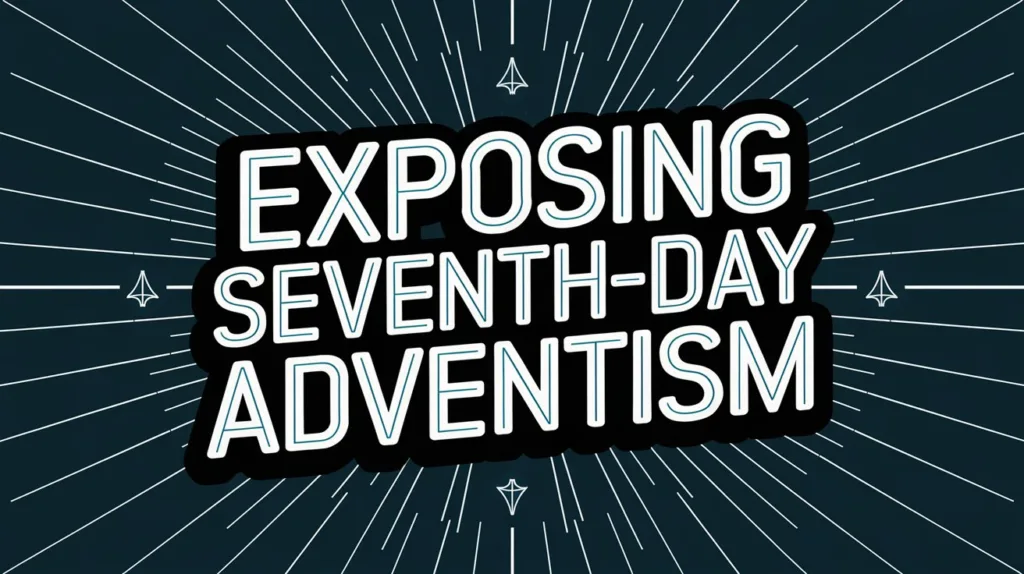This topic is both sobering and crucial for every believer to understand: Demons. What are they? Where did they come from? Are they fallen angels, or are they distinct from angels entirely? Can they possess people today, and more importantly, can they possess Christians? As we explore these questions, we’ll rely entirely on the Word of God as our foundation, but we’ll also briefly touch on historical, extrabiblical texts to provide additional context. Let’s pray for discernment as we tackle this important subject.
What Are Demons?
The word “demon” comes from the Greek word δαιμόνιον (daimonion), which is derived from δαίμων (daimon). In ancient Greek, daimon originally referred to a spiritual being or deity, not inherently evil, but one that could influence human affairs. Over time, particularly in the New Testament context, the term came to exclusively signify malevolent, unclean spirits that oppose God and seek to harm humanity.
The shift in meaning reflects the biblical understanding of demons as beings aligned with Satan, in contrast to the more neutral or even positive connotation the word carried in earlier Greek usage. This transition emphasizes their role in rebellion against God and their active participation in deception and destruction, as seen throughout Scripture.
As Paul wrote, “What am I saying then? That an idol is anything, or what is offered to idols is anything? Rather, that the things which the Gentiles sacrifice they sacrifice to demons (daimonia) and not to God, and I do not want you to have fellowship with demons” (1 Corinthians 10:19-20).
Demons are spiritual beings who exist to oppose God’s will and harm humanity. They are described throughout Scripture as “unclean spirits” (Matthew 12:43), “evil spirits” (Luke 7:21), and “deceiving spirits” (1 Timothy 4:1). Their very nature is rooted in rebellion, deceit, and destruction.
But where do demons fit within the spiritual hierarchy? Are they fallen angels? This is one of the most debated questions in theology. Many believe that demons are indeed fallen angels: those who joined Satan in his rebellion against God. Revelation 12:7-9 tells us about the great war in heaven where Michael and his angels fought against Satan and his angels. Satan and his followers were cast out of heaven, and many theologians believe these fallen angels became demons.
However, another possibility is that demons are not angels at all but are the disembodied spirits of the Nephilim, the giants mentioned in Genesis 6:4. The Nephilim were the offspring of fallen angels (“the sons of God”) and human women. While the Bible does not explicitly state that demons are the spirits of the Nephilim, some scholars and theologians have speculated this based on both biblical and extrabiblical sources.
The Book of Enoch, an ancient Jewish text that is not part of Scripture, provides an intriguing historical perspective. According to Enoch, when the Nephilim were destroyed, their spirits became malevolent, wandering the earth as demons. While the Book of Enoch is not God’s Word and should never be treated as Scripture, it may provide historical insights into how ancient cultures understood the origin of demons.
Regardless of their exact nature, one thing is clear: demons are real, and their purpose is to work in opposition to God and His people. As Jesus said in John 10:10, the enemy comes “to steal, and to kill, and to destroy.”
Where Did Demons Come From?
The Bible reveals that all things, including spiritual beings, were originally created by God. Colossians 1:16 says, “For by Him all things were created that are in heaven and that are on earth, visible and invisible, whether thrones or dominions or principalities or powers. All things were created through Him and for Him.” This means that demons were not created evil: they became so through rebellion.
If demons are fallen angels, their origin is tied to Lucifer’s rebellion against God. Isaiah 14:12-15 and Ezekiel 28:12-17 describe Lucifer’s fall from his exalted position due to pride and a desire to be like God. Revelation 12:4 speaks of a third of the angels following Satan in his rebellion and being cast out of heaven. These angels, now fallen, are often identified as demons.
But what if demons are the spirits of the Nephilim? In Genesis 6:1-4, we read about the “sons of God” (interpreted by many as fallen angels) taking human wives and producing offspring called the Nephilim. These giants were described as “mighty men of old, men of renown.” The flood in Noah’s time destroyed these beings, but some theologians speculate that their spirits remained and became demons.
The Book of Enoch elaborates on this idea, stating that the Nephilim were neither fully human nor fully angelic, and their spirits were cursed to wander the earth after their physical destruction. While this is an extrabiblical source and should not shape doctrine, it aligns with the notion that demons are disembodied spirits seeking bodies to inhabit.
Regardless of their specific origin, their ultimate fate is sealed: “the everlasting fire prepared for the devil and his angels” (Matthew 25:41).
Demons and Evil Spirits: Are They the Same?
The Bible uses the terms “demons,” “unclean spirits,” and “evil spirits” interchangeably, suggesting they refer to the same beings. In Luke 8:2, we read about Mary Magdalene, “out of whom had come seven demons.” In Mark 9:25, Jesus rebukes an “unclean spirit,” saying, “Deaf and dumb spirit, I command you, come out of him and enter him no more!” Similarly, in Acts 19:15-16, an “evil spirit” recognizes Jesus and Paul, affirming their authority but attacking an unbelieving exorcist.
These passages reveal several key characteristics of demons:
- Intelligence: Demons recognize spiritual authority (Acts 19:15).
- Personality: Demons speak and express their will, as in Mark 5:9, where a demon calls itself “Legion.”
- Malice: Demons seek to harm and deceive (1 Timothy 4:1).
One notable example of their activity is found in Mark 5:1-20. Jesus encounters a man possessed by a multitude of demons who call themselves “Legion.” A Roman legion consisted of up to 6,000 soldiers, suggesting the overwhelming force tormenting this man. The demons begged Jesus not to send them out of the region but into a herd of swine, which they promptly drove into the sea. This account demonstrates not only the destructive nature of demons but also their fear of Christ’s authority.
Can a Born-Again Christian Be Possessed?
This question is critical for believers. The short answer is no: a born-again Christian cannot be possessed by a demon. Why? Because the Holy Spirit dwells in every believer. Paul makes this clear in 1 Corinthians 3:16: “Do you not know that you are the temple of God and that the Spirit of God dwells in you?” The presence of the Holy Spirit makes it impossible for a demon to inhabit the same space.
However, Christians can face demonic oppression. While possession involves internal control, oppression is external, where demons attack through lies, temptation, or physical affliction. Consider Paul’s words in Ephesians 6:12: “For we do not wrestle against flesh and blood, but against principalities, against powers, against the rulers of the darkness of this age, against spiritual hosts of wickedness in the heavenly places.” This battle is real, but we are equipped with the armor of God (Ephesians 6:13-18) to stand firm against the enemy.
James 4:7 gives us the strategy for resisting demonic attacks: “Submit to God. Resist the devil and he will flee from you.” Submission to God through obedience, prayer, and reliance on His Word ensures victory.
Demon Possession: What Does It Look Like?
The Bible provides numerous examples of demon possession, each highlighting its devastating effects. In Mark 5:1-20, the demoniac lived among tombs, crying out and cutting himself. In Mark 9:17-27, a boy possessed by a demon experienced violent convulsions, often being thrown into fire or water. In Acts 16:16-18, a slave girl possessed by a spirit of divination followed Paul and Silas, proclaiming them servants of God until Paul cast the spirit out.
Possession often occurs when individuals willingly or unknowingly open doors to the demonic. Sin, occult practices, and even substance abuse can create these openings. Paul warns in Ephesians 4:27: “Do not give place to the devil.” This implies that our choices can either resist or invite demonic influence.
Jesus taught about this danger in Matthew 12:43-45, explaining that when an unclean spirit leaves a person, it seeks rest and eventually returns to its “house.” If the person is spiritually empty, the demon brings “seven other spirits more wicked than himself,” making the latter state worse than the first. This passage underscores the importance of being filled with the Holy Spirit and living in obedience to God.
Drugs, Alcohol, and Spiritual Vulnerability
Substances like drugs and alcohol can open doors to demonic influence by impairing judgment and weakening spiritual defenses. The Bible repeatedly warns against drunkenness and addiction. Proverbs 20:1 says, “Wine is a mocker, strong drink is a brawler, and whoever is led astray by it is not wise.” Paul adds in Ephesians 5:18: “Do not be drunk with wine, in which is dissipation, but be filled with the Spirit.”
The link between substance abuse and the spiritual realm is also seen in the Greek word pharmakeia, translated as “sorcery” in Galatians 5:20. This term, from which we derive “pharmacy,” refers to the use of drugs in occult rituals. Historically, drugs were used to alter consciousness and interact with the spiritual world, often inviting demonic activity.
Body, Soul, and Spirit: The Doorways to Influence
Humans are triune beings, composed of body, soul, and spirit. Paul confirms this in 1 Thessalonians 5:23: “Now may the God of peace Himself sanctify you completely; and may your whole spirit, soul, and body be preserved blameless at the coming of our Lord Jesus Christ.” Each aspect of our being can be affected by spiritual forces.
- Body: Demons can afflict the body, causing physical ailments, as seen in Luke 13:11-13, where a woman was bent over for eighteen years by a spirit of infirmity.
- Soul: The soul (our mind, will, and emotions) is a primary target for demonic lies and temptations (2 Corinthians 10:4-5).
- Spirit: The spirit is our connection to God. If it is not filled with the Holy Spirit, it can be vulnerable to other spirits, as demonstrated in Matthew 12:43-45.
The Authority of Jesus Over Demons
Jesus’ authority over demons was a central part of His earthly ministry. In Luke 4:36, the people marveled, saying, “With authority and power He commands the unclean spirits, and they come out!” Jesus cast out demons with a word, demonstrating His divine power.
This authority extends to believers. In Mark 16:17, Jesus says, “In My name they will cast out demons.” Through the Holy Spirit, we have the power to resist and expel demonic forces. However, we must remain vigilant and rely on God’s strength, not our own.
My Final Thoughts
Demons are real, but so is the victory we have in Christ. Whether they are fallen angels, the spirits of the Nephilim, or a combination of both, their fate is sealed. As Revelation 20:10 declares, they will be cast into the lake of fire.
As believers, we must stay grounded in the Word, filled with the Holy Spirit, and clothed in the armor of God. Remember, “He who is in you is greater than he who is in the world” (1 John 4:4).





 Get the book that teaches you how to evangelize and disarm doctrines from every single major cult group today.
Get the book that teaches you how to evangelize and disarm doctrines from every single major cult group today.